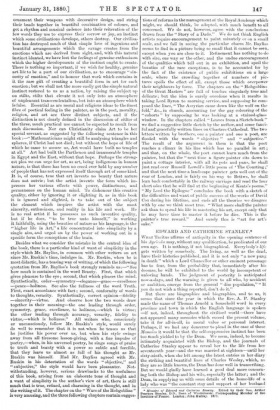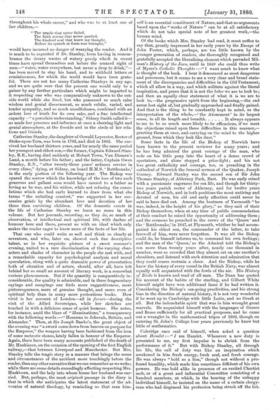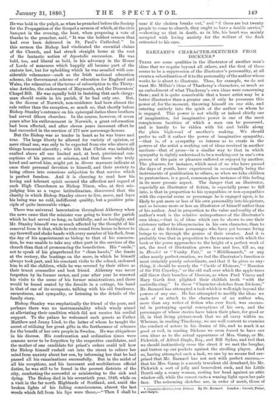EDWARD AND CATHERINE STANLEY.*
WIIAT Tacitus affirms of antiquity in the opening sentence of his Agricola may, without any qualification, be predicated of our own age. It is nothing, if not biographical. Everybody's life gets written by somebody. The living, as well as the dead, have their histories published, and it is not only "a new pang in death" which a Lord Chancellor or other eminent personage- has to fear, from the probability that, immediately after his decease, he will be exhibited to the world by incompetent or unloving hands. The judgment of posterity is anticipated now-a-days, and the warning is given to all who, by accident or ambition, emerge from the general "dim population," "If you do not wish a thing reported, don't do it."
But there are biographies and biographies, and to us, it seems that since the year in which the Rev. A. P. Stanley made the name of Thomas Arnold a household word in every province and town in which the English language is spoken —if not, indeed, throughout the civilised world—there have not appeared many memoirs which exceed the present volume, take it for all-in-all, in moral value or personal interest. Perhaps, if we bad any demurrer to plead in the case of these Memoirs it would be that the self-suppressive instinct has been too much yielded to by the Dean. We seem, indeed, to become intimately acquainted with the Bishop, and the journals of Catherine Stanley appear to reveal her to the life from her- seventeenth year—and she was married at eighteen—until her sixty-ninth, when she left among the latest entries m her diary the striking and beautiful lines of Charles Wesley, which, as they are so little known, the Dean has done well in transcribing. But we would gladly have learned a good deal more concern- ing both the Bishop and his wife, especially the latter ; and the Dean, in supplying us with some details of the home-life of a lady who was "the constant stay and support of her husband liftman of Edward and Catherine Manley. Edited by their son, Arthur Penrhyn Stanley, D.D., Dean of Westmioster. Corresponding Member of the Institute of France. London : Jolla Murray. 1679. throughout his whole career," and who was to at least one of tier children,— " The oracle that never failed,
The faith serene that never quailed, The kindred soul that knew my thought, Before its speech or form was wrought,"
-would have incurred no danger of wearying the reader. And it is much to be regretted if Dr. Stanley, from having in remem-
brance the dreary wastes of watery gossip which in recent times have spread themselves out before the amazed sight of men—" water, water everywhere, but never a drop to drink,"— has been moved to stay his hand, and to withhold letters or
reminiscences, for which the world would have been grate- ful. There are not too many Catherine Stanleys in any age, -and we are quite sure that the present one would only be a gainer by any further particulars which might be imparted to it respecting one who was comparatively unknown to the out- side world while she lived, but who possessed so much calm -wisdom and genial discernment, so much subtle, varied, and tender sympathy, and so much unselfishness, combined with an -ardent love of truth for its own sake, and a fine intellectual capacity—" a porcelain understanding," Sidney Smith called it— .as made her presence and influence at once a cheering light and genial atmosphere, at the fireside and in the circle of her rela- tions and friends.
Catherine Stanley, the daughter of Oswald Leycester, Rector of Stoke-upon-Tern, was born in 1792, and died in 1862. She sur- vived her husband thirteen years, and for nearly the same period her youngest and eldest son,—the former, Captain Edward Stan- ley, R.E., having died suddenly at Hobart Town, Van Diemen's Land, a month before his father ; and the latter, Captain Owen Stanley, R.N., "after twenty-three years' arduous service in every clime," dying, at Sidney, on board H.M.S. 'Rattlesnake,' in the early portion of the following year. The Bishop was spared the sorrow which the knowledge of the loss of two such generous and gallant sons would have caused to a father so loving as he was, and his widow, while not refusing the conso- lations which she had early learned to draw from what she terms "the unfailing comfort," was supported in her suc-
cessive griefs by the abundant love and devotion of her three then surviving children. Of the domestic events in
the life of Catherine Stanley we learn no more in this volume. But her journals, recording, as they do, so much of -observation, of intellectual and spiritual life, with dashes of humour here and there, present us with an ideal which only makes the reader eager to know more of the facts of her life.
That one who could write so well and think so clearly at seventeen, and who, later on, showed such fine descriptive talent, as in her exquisite picture of a sweet summer's -evening, united to a rare discrimination of the varying char-
acters and shades of character in the people she met with, and a remarkable capacity for psychological analysis and moral speculation, along with a quite dramatic power of presentation both of situation and of actors, should, after all, have left behind her so small an amount of literary work, is a somewhat -curious phenomenon. But if the quantity is comparatively in- considerable, the quality is admirable, and in these fragmentary sayings and essayings one finds more suggestiveness, more picturesqueness, more of genuine thought, and more even of spiritual help than in many more pretentious books. How vivid is her account of London—all in furore—during the visit of the Allied Sovereigns, while her sketches are -touched in with a delicious sense of quiet humour. She notes, for instance, amid the blaze of "illuminations," a transparency with the following words :—" Hosanna to Jehovah, Britain, and Alexander." Then, at Sir Joseph Banks's, the great object of the evening was "a sword come down from heaven on purpose for the Emperor," the weapon having been fashioned from the iron of some meteoric stones, lately fallen in honour of the Emperor. Again, there have been many accounts published of the death of
Mr. Hu skisson, on the occasion of the opening of the first English railway,—that between Liverpool and Manchester. But Mrs.
Stanley tells the tragic story in a manner that brings the scene -an d circumstances of the accident more touchingly before the -reader, than any other narrative th at we can remember as we write; -while there are some details exceedingly affecting respecting Mrs. Huskisson, and the lady into whose house her husband was car- ried. But, perhaps, the most original, passage in the diary is that in which she anticipates the latest statement of the ad- vocates of natural theology, by reminding us that man him-
self is an essential constituent of Nature, and that no arguments based upon the "works of Nature" can be at all satisfactory which do not take special note of her greatest work,—the human mind.
Of the books which Mrs. Stanley had read, it must suffice to say that, greatly impressed in her early years by the Essays of John Foster, which, perhaps, are too little known by the younger generation of readers, she thoroughly recognised and gratefully accepted the liberalising element which pervaded Mil- man's History of the Jews, until in 1849 she could thus write of Myers's Catholic Thoughts :—" I want much to know what is thought of the book. I hear it denounced as most dangerous and poisonous, but it seems to me a very clear and broad state- ment of the discrepancies and difficulties in the Old Testament, which all allow in a way, and which militate against the literal inspiration, and prove that it is not the letter we are to look to ; and then an equally clear statement of what it is we are to look to,—the progressive spirit from the beginning,—the end never lost sight of, but gradually approached and finally gained. And that is the thing to be constantly kept in mind, as the interpretation of the whole,--' the Atonement' in its largest
sense, in all its length and breadth It always appears to me to be so much more likely to be efficacious, if we meet the objections raised upon these difficulties in this manner,— greeting them at once, and carrying on the mind to the higher ground, from which they look like dust."
Some facts in the life of the Bishop of Norwich have been known to the present reviewer for many years ; and he has long admired the great courage of the man, who rode on his little pony into the heart of a dense crowd of spectators, and alone stopped a prize-fight ; and his not less great catholicity and courage, too, in preaching in the cathedral of Norwich the funeral sermon of the Quaker, Joseph Gurney. Edward Stanley was the second son of Sir John Thomas Stanley, of Alderney Park, Bart. He was early seized with a passionate eagerness for sea life, and though for thirty- two years parish rector of Alderney, and for twelve years Bishop of Norwich, and in both positions the most untiring and devoted of men, his old and early affection could never be said to have died out. Among the boatmen of Yarmouth "he was, indeed, in the height of his glory," as they said of their Bishop themselves, when at any time of public commendation of their conduct he seized the opportunity of addressing them ; and the sermons he preached to the crews of the 'Queen' and the 'Rattlesnake,' in 1847, at Plymouth, whither he had accom- panied his eldest son, the commander of the latter, to take farewell of him, were never forgotten. It was all the Bishop could do, he himself informs us, to command his own feelings ; and the men of the Queen,' as the Admiral told the Bishop's son more than twenty years after, nearly one thousand in number, were so crowded that they almost sat on one another's shoulders, and listened with such attention and admiration that they could scarce restrain a cheer. And the Bishop, while he knew the history of every vessel in the British Navy, was almost equally well acquainted with the fowls of the air. His History of Birds is known and read of all men. The Dean has quoted his account of the habits of the starling, and Gilbert White himself might have won additional fame if he had written it. Considering the Bishop's sea-going proclivities, and his strong bias in the direction of natural history, it is not very wonderful if he went up to Cambridge with little Latin, and no Greek at all. Bat the indomitable spirit that was in him wrought great marvels. He acquainted himself with the languages of Greece and Rome sufficiently for all practical purposes, and he came out a wrangler in the mathematical tripos of 1802, though on entering St. John's College four years previously he knew but little of mathematics.
Coleridge once said of himself, when asked a question about Hamlet :—" I am Hamlet. Whenever a new duty is presented to me, my first impulse is to shrink from the performance of it." But with Bishop Stanley, all through his life, the call of duty was like an inspiration which awakened in him fresh energy, fresh zeal, and fresh courage. He was always "bold as a lion," though not without a pro- found humility, which made him sometimes diffident of his own powers. He was bold alike in presence of an excited Chartist mob, or of a great and influential Committee consisting of a hundred members, at which, in the hearing of the unhappy individual himself, he insisted on the name of a certain clergy- man who had disgraced his profession being struck off the list.
He was bold in the pulpit, as when he preached before the Society for the Propagation of the Gospel a sermon of which, at the civic banquet in the evening, the host, when proposing a vote of thanks to the preacher, said, "It was the boldest sermon that had ever been delivered in St. Paul's Cathedral." In this sermon the Bishop had vindicated the essential claims of the Church, and had struck straight home at the root of the fantastic notion of Apostolic succession. He was 'bold, too, and liberal as bold, in his advocacy in the House of Lords of measures which happily all became part of the statute law, but for upholding which he was assailed with con- siderable vehemence—such as the Irish national education scheme, the Government scheme of education for England and Wales, the relaxation of the terms of subscription to the Thirty- nine Articles, the endowment of Maynooth, and the Dissenters' 'Chapel Bill. He was equally bold in insisting that each clergy- man should reside in his parish, if he had only one. But, in the diocese of Norwich, non-residence had been almost the rule rather than the exception, so much so, that shortly before Bishop Stanley's entrance on his episcopal duties three brothers had served fifteen churches. In the course, however, of seven years after his enthronement in Norwich, a great reformation had been effected, and after eleven years incessant effort he had succeeded in the erection of 173 new parsonage-houses.
But the Bishop was as tender in heart as he was brave and true. The large liberty he allowed for variety of opinion, or mere ritual use, was only to be expected from one who above all things honoured sincerity ; who felt that Christ was infinitely exalted above all our limited and, at best, provisional con- ceptions of his person or mission, and that those who truly loved and served him, might yet in divers manners indicate at once their personal devotion to himself, and their anxiety to bring others into conscious subjection to that service which is perfect freedom. And it is cheering to read how his loving and tolerant spirit secured the affection and regard of such High Churchmen as Bishop Nixon, who, at first mis- judging him as a vague latitudinarian, discovered that the charity in which Bishop Stanley strove to live, move, and have his being was no cold, indifferent quality, but a positive prin- ciple of quite inexorable virtue.
There was universal lamentation throughout Alderney when the news came that the minister was going to leave the parish which he had served so long, so faithfully, and so lovingly, and Mr. Stanley himself was so much affected by the thought of his removal from it that, while he rode round from house to house to say farewell and shake hands with every member of his flock, from the day of his appointment as bishop to that of his consecra- tion, he was unable to take any other part in the services of the church than that of pronouncing the benediction. His "smile," not to speak of his gingerbread for "clean hands," the feasts at the rectory, the boatings on the mere, in which he himself always took part, and his constant visits to the school, endeared him to all the children, while he was revered by their elders as their truest counsellor and best friend. Alderney was never forgotten by its former rector, and year after year he renewed his visits to the scene of his former ministrations, and there would be found seated by the fireside in a cottage, his hand in that of one of its occupants, talking with his old frankness, earnestness, and, sympathy, or listening to the details of the family story.
Bishop Stanley was emphatically the friend of the poor, and perhaps there was no instrumentality which wisely aimed at alleviating their condition which did not receive his cordial support. To the palace he welcomed such guests as Father Matthew and Jenny Lind, to the latter of whom he taught the secret of utilising her great gifts in the furtherance of schemes for the benefit of her own people in Sweden. He was ubiquitous in his diocese. His confirmation and ordination times were seasons never to be forgotten by the respective candidates, and the mother of one candidate for priest's orders could tell how the Bishop himself rushed out into the street to relieve her mind from anxiety about her son, by informing her that he had passed all his examinations successfully. But in the midst of all his receptions, and his incessant and multifarious official duties, he was still to be found in the poorest districts of the city, comforting the sorrowful or ministering to the sick and
dying. The Bishop died in his seventieth year, 1849, while on a visit in the far north Highlands of Scotland, and, amid the broken lights of his failing consciousness, almost the last words which fell from his lips were these,--" Then I shall be
near if the cholera breaks out," and "if there are but twenty people to come to church, they ought to have a double service," —showing us that in death, as in life, his heart was mainly occupied with loving anxiety . for the welfare of the flock entrusted to his care.




































 Previous page
Previous page